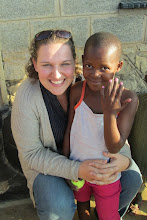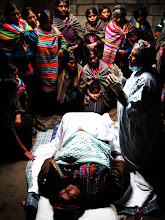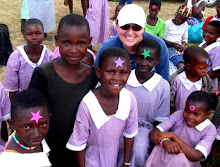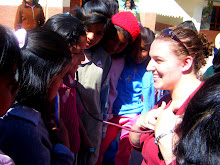Beneath the deafening silence and pensive looks, Grandpa hides a genius that rifles most of my generation (not to mention his.) He's deeply spiritual, a veracious reader, and wise to the core. Just when you've written him off as either deaf or completely uninterested, you'll hit the right witty remark and his face will break into a giant smile that tickles everything, right down to his slightly off-kilter beard.
The last of a generation, he hails from a time and place that seem a distant memory in American history. As a boy, he lived through the Great Depression, grew up on a self-sufficient farm in rural Virginia, went to school in a one-room school house, and knew what it was to work to survive. He served our nation in the US. Army, was the first in our family's history to earn a doctoral degree, and has spent more than half a century married to the love of his life, my Grandma. He comes from a generation that valued family, community, and doing the right thing, no matter the cost. They don't make men like him anymore.
Or do they?
In this corner of the world, Grandpa bears a striking resemblance to many of my Basotho neighbors, including my host father, Ntate Bereng Qoaqoa. Ntate Bereng, whom my Basotho family affectionately calls "Baba" (meaning "father" in Zulu), is a subsistence farmer who's close connection and intimate reliance on the land still baffles me. He was born and raised in the village of Ha Selomo, just like his father and his father before him. Much like my own family, Ntate Bereng's ancestors fought and defended the land that we now call Lesotho against the Dutch, and then the British. Here they call it "Basotho-land," and this hard-won, mountainous land is the core of this proud, yet peaceful, culture of farmers and herds-men. Grandpa and Ntate Bereng share a common devotion to hard-work, and a knowledge of what it is to struggle with and simultaneously love a piece of this earth. More often than not, I'll find Ntate Bereng sitting quietly after a long day of work, watching his 3 cows graze or the sun set. His quiet presence and patient nature reminds me daily that everything has a time, place, and rhythmn to it that can't be hurried.
In another striking similarity, Grandpa and Ntate Bereng also share an intense devotion to family and community... For Ntate Bereng (as with most Basotho,) this value is deeply rooted in Basotho culture, where there is little distinction between the two concepts. Villagers commonly address each other as ngoanes'o, meaning child of my mother (ie. brother/sister), and all men and women of childbearing age are called 'Me (mother) or Ntate (father.) Blood relation means very little as a distinction or attachment... The concept of "family" is fluid, and is often applied to people you care for or feel beholden to care for. In Ha Selomo, the villagers call me ngoanaka oa Ntate Bereng or Ntate Bereng's child. It's a family position I share with his biological children, grandchildren, innumerable nieces and nephews, and several close family friends. As the head of the family and an elder in the village, he cares for us all in the same way: feeding those without food, and willingly giving up his home, bed, and even chicken house when needed to support a member of his "family."
The loose interpretation of "family" in Basotho culture also means the term "orphan" has a very different connotation in Lesotho. There are MANY orphans in Lesotho, because there are many children who have lost their biological parent's (especially to HIV/AIDS.) Were you to ask a Mosotho, however, they'd tell you there is no such thing as a child without a family. That's why adoption is such a puzzling, bizare, and, quite frankly, rare practice in Lesotho. There's no need for a legal process to make a child a member of your family- They always were. Your neighbor's child might as well be your own. Everyone who has a village has a family.
I find myself thinking about Grandpa a lot in Lesotho. In part because I think it's ironic, yet oddly wonderful, that life seems to have a certain cyclicity to it. I sometimes feel as if, by living in Lesotho, I'm glimpsing the past... The America of my Grandfather's childhood. A time when family's worked hard WITH the land and each other to survive (as opposed to raping and pilaging it for all it's worth.) In Basotho culture, there's a kind of reverance and appreciation for the land. I see that influence in my Grandpa's love of nature, but I wonder if other Americans, who don't share my family's roots, have lost that kind of connection.
Lesotho takes me back to a simpler time... A time when schools had dirt floors and chalk-boards, and getting there meant an hour walk at sunrise "uphill both ways," as Granpa always said. When family and community mattered. When kids ran wild, and parent's didn't worry about safety. When not greeting a stranger on the road was rude, and time wasn't something to be measured and meticulously controlled, but appreciated and savoured as a gift.
I find myself becoming more like Grandpa... More like Ntate Bereng. My garden is my favorite place in village. Working in it- digging my hands into moist soil, sitting contemplatively for hours while Pina chases butterflies, watching a rock wall grow taller with my labor- is therapy and comfort. Good for my soul in a way that I hadn't discovered before living here. When I'm in village, time slows down... I leisurely wander over to the shopong, have time to talk to everyone along the way, and greet my neighbors by name. I enjoy the sounds of the herd boys singing to their cattle in the evening, and notice every sunrise and sunset. It's refreshing. The kind of world I want to live in.
It makes me think that maybe this isn't such a bad thing... Becoming Grandpa.
With Love from Lesotho... -Mary E.






No comments:
Post a Comment